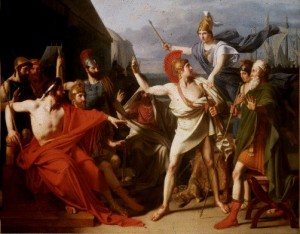 Poems are often one of the most expressive formats for writing about emotional topics. Although love and romance are probably the most prevalent themes, the subject of war certainly has its place in the world”s collections of poems. War is one of the more emotional aspects of our world, whether in the present or in the distant past. It affects so many people. It isn”t just the soldier going off to battle who is impacted by the throes of war, but also the families at home, the community from where that soldier is from, and the country that soldier represents. If that war is being waged in that soldier”s homeland, than certainly, the war has a major impact on the innocent civilians who are placed in harm”s way. There is the devastation to the land to consider, the interruption of entire economies, and disruption of the daily lives and dreams of anyone whom war may decide to affect.
Poems are often one of the most expressive formats for writing about emotional topics. Although love and romance are probably the most prevalent themes, the subject of war certainly has its place in the world”s collections of poems. War is one of the more emotional aspects of our world, whether in the present or in the distant past. It affects so many people. It isn”t just the soldier going off to battle who is impacted by the throes of war, but also the families at home, the community from where that soldier is from, and the country that soldier represents. If that war is being waged in that soldier”s homeland, than certainly, the war has a major impact on the innocent civilians who are placed in harm”s way. There is the devastation to the land to consider, the interruption of entire economies, and disruption of the daily lives and dreams of anyone whom war may decide to affect.
I”m not sure what the very first war poem was, but one of the early classics of literature which holds war as its topic if the Iliad by the Greek poet Homer. The Iliad takes place during the Trojan War, which was the siege of the Greek city of Troy by a group of Greek states. The story describes the various events and battles which took place between Achilles and King Agamemnon.
The war is reported to have lasted over ten years; however, this epic poem recounts only a couple of weeks during the war”s final year. The story reports several key events, including efforts to round up enough soldiers for the battle and the underlying causes of the siege against Troy. From there, the poem changes to a more prophetic narrative, which included the impending death of Achilles and the sacking of the city of Troy.
The Iliad (excerpt)
Homer

Of course, not all poems about war are as long as the Iliad. For instance, the Japanese Samuri often composed a few lines of poetry before going off to battle. Many realized that they would not be returning, so these poems served as their final words to their loved ones or to the people of their homeland. One example is etched into the door of a temple at the tomb of tomb of Go-Daigo, the ninety sixth emperor of Japan. The author of the poem was Kusunoki Masatsura who was a samuri sent into battle. Prior to leaving for war, he took his soldiers to worship at Go-Daigo”s tomb. Masatsura, along with his soldiers, died shortly after joining the battle. The words of the poem are both fatalistic and prophetic — an indication that Masatsura already understood the outcome of the battle before it was ever fought.
Untitled
by Kusunoki Masatsura

There are certainly many other war poems which one could chose to review, but I think these two reflect the diversity of poetry about war that is available today. Each of the major conflicts has volumes of poetry, written by soldiers, wives and girl friends, sons and daughters, and by casual observers. War impacts us all.


You must register to comment. Log in or Register.